什麼是中式坐月子?
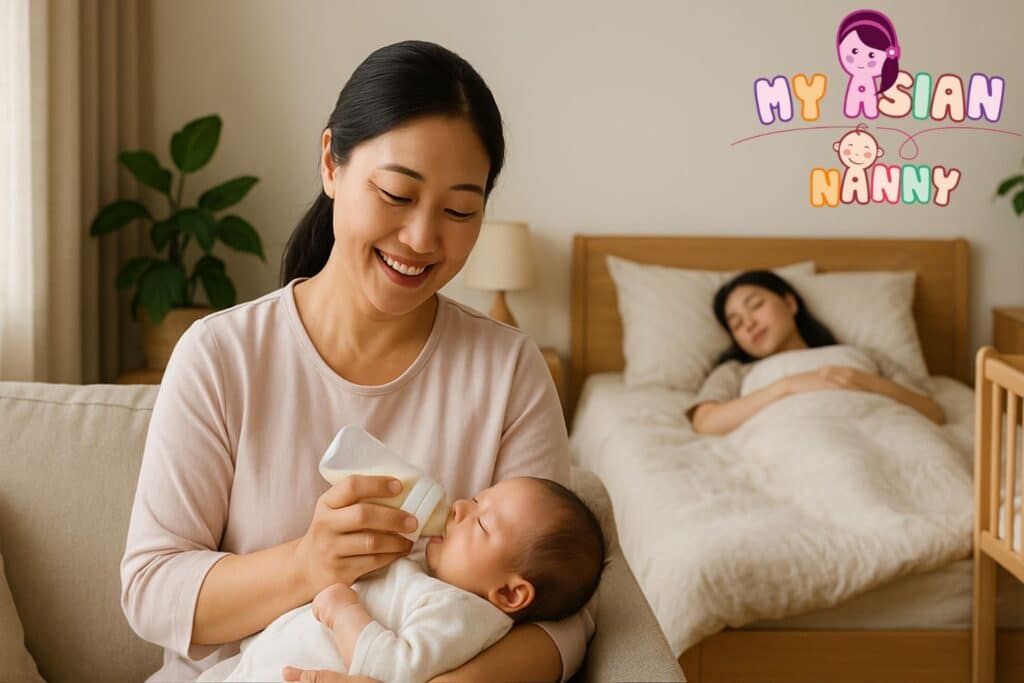
Chinese confinement, known as zuò yuè zi (坐月子) or “sitting the month,” is a well-established postpartum tradition with over 2,000 years of history. This comprehensive practice guides new mothers through the critical 30-100 days after childbirth, emphasizing rest, specialized nutrition, warmth, and dedicated care. The Chinese confinement period refers to this traditional practice, typically lasting from one to three months, and is designed to support both the mother’s recovery and the baby’s early development. Deeply rooted in Traditional Chinese Medicine (TCM) principles, confinement helps mothers recover holistically—addressing physical healing, emotional well-being, and the transition to motherhood.
Whether you’re expecting your first child, supporting someone who is, or simply interested in traditional postpartum care approaches from around the world, this in-depth guide explores every aspect of Chinese confinement. Chinese society has played a significant role in shaping and preserving these postpartum practices, ensuring their continued relevance and adaptation in modern times. From its ancient origins to modern adaptations, we’ve consulted with TCM practitioners, experienced postpartum doulas, and mothers who have practiced confinement to bring you authentic, practical information.
As Western interest in holistic postpartum recovery grows, many parents are discovering the wisdom in this time-honored tradition that prioritizes maternal recovery and newborn bonding in those crucial first weeks. During the Chinese confinement period, special attention is given to the baby’s needs, with practices focused on protecting the baby’s health and supporting the baby’s well-being alongside the mother’s recovery.
您將在本指南中學到什麼
什麼是中式坐月子?起源和理念
Chinese confinement is a comprehensive postpartum recovery system that dates back to the Han Dynasty (206 BCE-220 CE). As a traditional practice, it holds historical significance in Chinese culture for supporting mothers after childbirth. The practice developed from observations that women who rested completely after childbirth seemed to experience fewer long-term health complications than those who resumed activities too quickly. The term zuò yuè zi (坐月子) literally translates to “sitting the month,” reflecting the emphasis on rest and minimal movement during this critical recovery window.
According to Traditional Chinese Medicine (TCM), childbirth creates a significant imbalance in the body’s energy systems. Labor and delivery cause what practitioners call a “great opening” of the body, depleting blood and vital energy (qi) while leaving new mothers vulnerable to harmful elements like cold air and wind. The confinement period is designed to protect mothers after they have given birth, close this energetic gateway, restore balance, and prevent chronic health issues that might otherwise manifest years later.
Over time, the development of this practice has been influenced by both medical theories and cultural transmission, with some customs passed down as wives tales and traditional beliefs.
Traditional confinement practices are specifically designed to support a woman’s recovery after giving birth, emphasizing rest, nutrition, and protection from environmental stressors.
中式禁閉的核心原則
坐月子的理念圍繞四個關鍵要素:
- 恢復平衡 – 修復分娩過程中被破壞的陰陽平衡
- 保護身體免受環境因素 的影響 – 保護身體免受寒冷、風和濕氣的影響
- 補血氣 – 通過特定營養和休息重建元氣
- 預防未來疾病 – 徹底解決產後癒合問題以避免慢性健康問題
從歷史上看,宮廷和普通家庭之間的禁閉做法各不相同,前者由宮廷醫生準備精心設計的儀式和專門的食物,而普通家庭則祖母將民間智慧代代相傳。今天,禁閉仍然深深植根於中國、臺灣、香港、馬來西亞和新加坡的文化中,韓國和越南社區的興趣也越來越大。
在坐月子期間,新媽媽傳統上:
- 留在室內 – 保持在受控環境中,遠離氣流、風和溫度波動
- 食用溫熱的食物 – 吃專門準備的飯菜,驅除寒冷並補充營養
- 避免寒冷暴露 – 保持溫暖,包括限制與冷水或空調的接觸
- 限制身體活動 – 盡量減少家務活、劇烈運動,甚至閱讀
- 接受專業護理 – 接受經驗豐富的家庭成員或專業月子保姆的支援
中式月子在全球產後傳統中的獨特之處在於其系統的方法和全面的性質。它不僅關注嬰兒,還承認分娩的深刻身體變化,並將母親的完全康復視為對她長期健康和福祉至關重要。
今天的年輕父母經常質疑這些傳統的科學依據。雖然一些做法已經被現代研究驗證——例如休息對組織修復的好處和某些營養原則——但其他做法仍然更多地植根於文化智慧,而不是經驗證據。正如許多從業者現在所建議的那樣,最有效的方法是在傳統智慧和現代對產後健康的理解之間找到平衡。
遵循坐月子做法的主要好處
When properly implemented, Chinese confinement offers numerous potential benefits for new mothers during the fourth trimester, a critical phase of physiological and emotional recovery. As a traditional practice, Chinese confinement has implications for public health, influencing maternal well-being and the risk of postpartum depression. Understanding these advantages can help families decide which aspects of the tradition they wish to incorporate into their own postpartum journey. A systematic review has examined the benefits of confinement, providing a structured synthesis of the available evidence.
身體恢復的好處
- 加速生殖系統的癒合 – 集中的休息期使子宮能夠正常收縮並恢復到懷孕前的狀態
- 降低脫垂風險 – 避免提重物和劇烈活動有助於增強盆底肌肉
- 更好的血液補充 – 富含鐵的食物和草藥有助於解決產後失血問題
- 改善泌乳 – 特定食物和湯旨在提高牛奶產量和品質
- 關節和骨骼修復 – 高膠原蛋白食物支持懷孕后肌肉骨骼的癒合
心理和情感益處
- 減少產後焦慮 – 結構化的例程在脆弱時期提供安全感
- 防止 「做太多太早」 – 保護人們免受社會壓力,以迅速恢復正常活動
- 增強母嬰關係 – 集中時間進行依戀,不受外部干擾
- 社區支援 – 傳統上承認新媽媽應該和需要照顧
發表在《 婦產科研究雜誌 》上的研究表明,與沒有觀察的母親相比,觀察某種形式的坐月子的母親報告的產後抑鬱症發生率較低。雖然相關性不能證明因果關係,但營養支援、休息和實際幫助的結合可能有助於改善孕產婦的健康情況。
值得注意的是,嚴格遵守所有傳統規則並不是獲得好處的必要條件。許多現代從業者建議根據個人情況調整坐月子原則,同時保持休息、營養、溫暖和支援的核心理念。
坐月子飲食:治癒食物和營養原則
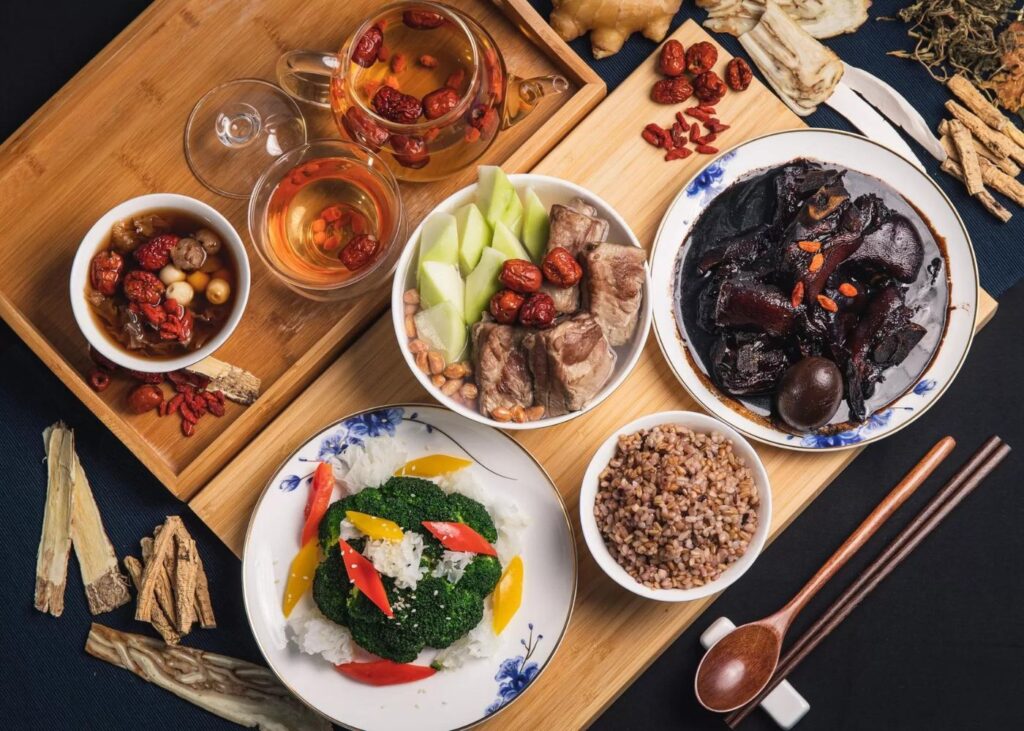
The confinement diet is perhaps the most distinctive and carefully preserved aspect of Chinese postpartum care. According to TCM practitioners, what a mother consumes during this period significantly impacts her recovery trajectory and future health. This isn’t simply about caloric intake—it’s a sophisticated nutritional system designed to heal, restore, and prevent specific postpartum conditions. The confinement diet is specifically crafted to support new mums and new parents during the crucial recovery period after childbirth.
月子飲食遵循幾個基本原則:
- “熱”和“冷”特性的平衡 – 不是溫度,而是食物的能量性質
- 補血和氣恢復 – 優先食用補充生命能量的食物
- 促進泌乳 – 包括提高產奶量的催乳劑
- 消化支援 – 易於吸收的營養物質,不會對正在恢復的消化系統造成負擔
- 抗炎作用 – 減少產後炎症的草藥和食物
必需的月子食品
月子飲食通常包括:
- 生薑芝麻油雞 – 一道溫暖的菜餚,被認為可以消除體內的“風”,同時提供蛋白質和必需脂肪酸。生薑被認為是坐月子期間最重要的治療成分之一。
- 黑醋豬蹄 – 這道富含鈣的菜餚將豬蹄中的膠原蛋白與在加糖黑醋中燉煮的雞蛋中的鐵和礦物質相結合。它特別適用於增強骨骼和關節。
- 紅棗和龍眼茶 – 這種甜飲料含有紅棗(中國紅棗)和龍眼果,這兩種水果都被認為可以增加血液流動和改善血液迴圈,同時提供天然的甜味。
- 木瓜魚湯 – 鮮魚提供瘦肉蛋白,而木瓜被認為可以促進產奶。這種組合支援哺乳並提供 omega-3 脂肪酸。
- 黑雞草藥湯 – 烏雞(黑骨雞)因其高鐵含量而備受推崇,通常與當歸(當歸根)等草藥結合使用以補充血液。
- 肝臟和腎臟菜餚 – 內臟提供濃縮鐵、B 族維生素和傳統上被認為可以增強母親體內相應器官的營養物質。
- 全穀物和米酒 – 糙米、小米和少量米酒提供能量,被認為可以改善血液迴圈。
坐月子期間應避免的食物
與吃什麼同樣重要的是坐月子期間不吃什麼:
- “冷”食物 – 包括黃瓜、西瓜、綠豆、大多數生蔬菜和柑橘類水果
- 過於辛辣的食物 – 辣椒和濃郁的香料可能會干擾消化並影響母乳
- 冷飲 – 嚴禁使用冰水、冷果汁和冷藏飲料
- 鹹味食物 – 過量的鹽分被認為會導致水潴留並阻礙癒合
- 特定的海鮮品種 – 一些傳統避免蝦、螃蟹和某些白魚
現代營養學觀點
從當代營養的角度來看,許多月子飲食習慣與合理的產後營養建議相一致。強調蛋白質支持組織修復,富含鐵的食物解決血液流失問題,溫暖、易消化的飯菜提供舒適和穩定的能量。然而,嚴格避免水果和蔬菜可能會導致纖維和某些維生素不足。
漸進式坐月子營養學家現在建議加入輕度煮熟的蔬菜和室溫水果,以確保營養均衡,同時尊重傳統框架。關鍵是要保持變暖原則,同時確保完整的營養支援。
專業的月子餐送餐服務在亞裔人口眾多的城市越來越受歡迎。這些服務將傳統食譜與現代營養科學相結合,為希望遵守飲食傳統而又沒有複雜準備負擔的家庭提供方便的解決方案。
基本的月子湯和草藥
在中國的月子傳統中,治癒湯在產後恢復中起著核心作用。這些不是普通的肉湯,而是幾個世紀以來精心開發的藥用製劑,用於解決產後癒合的特定方面。月子湯將蛋白質來源、蔬菜和草藥結合成滋養滋補品,旨在易於消化並被恢復的身體迅速吸收。
中醫從業者將這些湯視為先葯,其次是食物。每種成分都有治療目的,選擇組合來平衡身體的能量,支援器官功能,並解決特定的產後需求,如補血、產奶和子宮癒合。
治療性月子湯
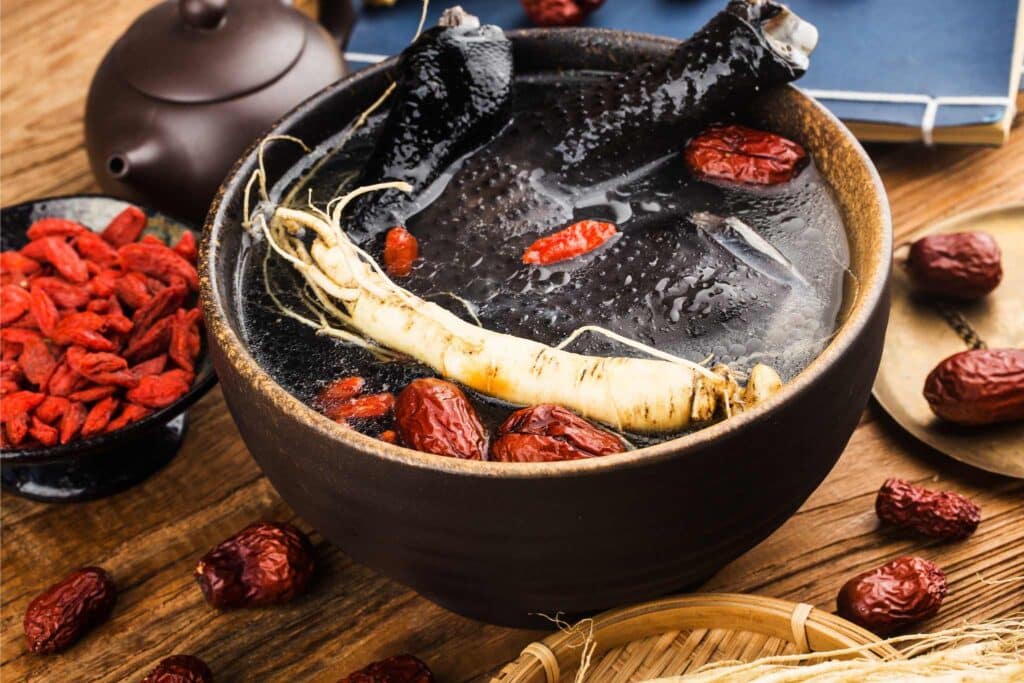
- 生化湯 (華生化湯) – 一種基本的產後補救措施,含有當歸 (dang gui)、四川獨活根 (Chuan Xiong)、桃仁 (tao 任) 和其他草藥。這種湯通常在出生後立即食用,以促進血液迴圈,減少停滯,並促進惡露的排出。
- 黑雞和當歸湯 – 烏雞提供優質蛋白質和鐵,而當歸(當歸根)以補血而聞名。枸杞、紅棗和黃芪根等其他草藥可增強免疫功能和能量。
- 木瓜魚湯 – 新鮮的魚(通常是鯉魚或鱸魚)與青木瓜一起燉,青木瓜含有被認為可以刺激產奶的酶。加入生薑和米酒來加熱湯並防止魚的“寒冷”特性。
- 紅棗和龍眼茶 – 這種甜美、溫暖的飲料結合了紅棗(棗)、龍眼乾和枸杞,可滋養血液、平靜心靈並提供溫和的能量。它通常在兩餐之間全天食用。
- 豬肘醋湯 – 豬肘與雞蛋一起在加糖的黑醋中燉,可以創造出一種富含鈣的藥物,被認為可以增強在懷孕和分娩期間可能已經變弱的骨骼和關節。
禁閉中的草藥製劑
除了湯,坐月子可能包括專門的草藥製劑:
- 草藥浴 – 艾蒿、生薑和其他溫暖草藥的浸泡,用於海綿浴或泡腳
- 涼酒 – 少量米酒注入治療草藥以改善血液迴圈
- 藥用粥 – 用草藥烹製的米粥,為早晨提供溫和的營養
- 草藥敷料 – 將熱敷敷在腹部以支持子宮收縮和癒合
這些藥物傳統上是每天新鮮製備的,但在現代實踐中,有些可以從專門的中藥房以預包裝形式獲得。許多家庭現在使用電陶瓷慢燉鍋來保持最佳提取藥用特性所需的恆定、溫和的燉煮。
雖然對特定月子湯的科學研究仍然有限,但這些食譜中使用的一些個別草藥的藥用特性已被研究。例如,當歸已在實驗室研究中顯示出造血(造血)作用,而生薑的抗炎特性則有據可查。
與坐月子的其他方面一樣,這些治療性湯在根據個體母親的體質和特定的恢復需求量身定製時最有效。建議諮詢合格的中醫醫師,特別是對於已有健康情況或正在服用藥物的女性。
中國禁閉期間的日常生活
坐月子期間的日常生活節奏遵循一種刻意緩慢的養育模式,優先考慮恢復和聯繫。與西方環境中通常混亂的育兒初期不同,中國的坐月子建立了一個結構化的例行公事,消除了決策疲勞,併為新媽媽創造了一個可預測性的繭。
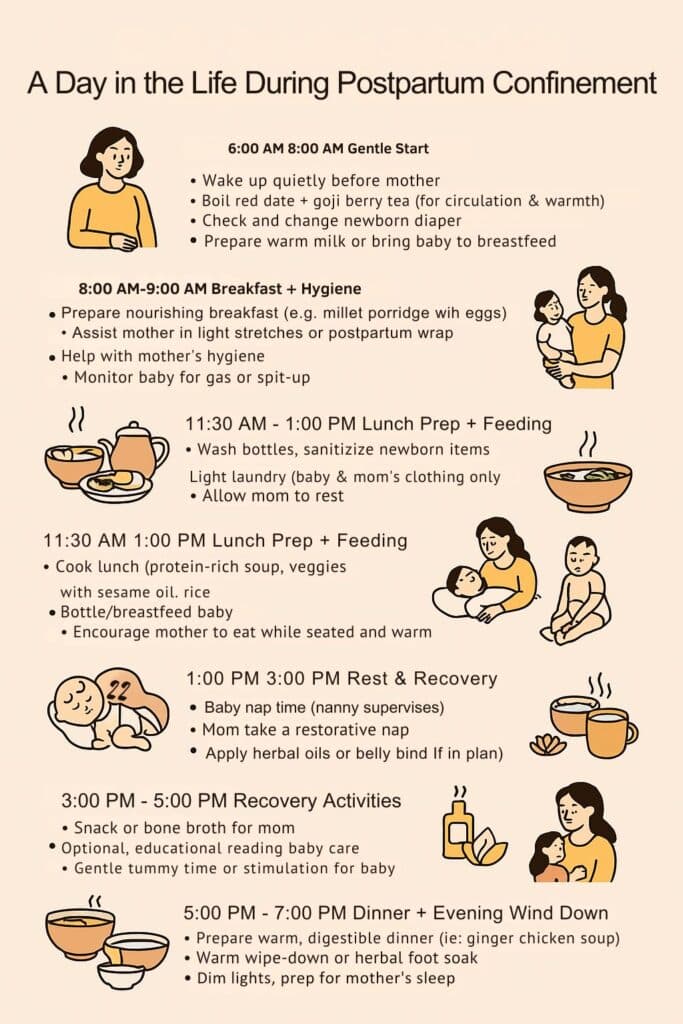
上午例行公事 (6:00 AM – 11:00 AM)
這一天通常從母親收到她的第一杯熱飲開始,通常是紅棗茶或溫和的草藥補品,送到她的床邊。接下來是:
- 早晨餵養 – 在看護者的支援下進行母乳餵養或吸乳
- 輕度清潔 – 用溫毛巾浴薑水或草藥浸泡液
- 營養早餐 – 通常是含蛋白質的熱米粥(粥),如雞絲、肝絲或雞蛋絲
- First herbal soup – 專為早晨補充能量和血液而設計的藥湯
- 輕柔的運動 – 在房間內非常有限的伸展或行走(第一周后更常見)
下午例行公事 (11:00 AM – 5:00 PM)
中午專注於營養和休息:
- 豐盛的午餐 – 通常是一天中最大的一餐,以溫熱的蛋白質、煮熟的蔬菜和米飯為特色
- 休息時間 – 在看護人處理嬰兒護理時延長小睡時間
- 下午餵奶 – 母乳餵養或吸奶,注意正確的姿勢
- 小吃 – 堅果、乾果或一小份適合坐月子的食物
- 非常有限的訪客時間 – 如果允許,通常僅限於直系親屬
晚間活動 (5:00 PM – 10:00 PM)
晚上的過渡強調放鬆:
- 早飯 – 一頓溫暖的飯菜,通常以湯為基礎,添加額外的蛋白質
- 晚間草本滋補品 – 用於夜間癒合的專用配方
- 溫和的衛生 – 溫熱的毛巾清潔、草藥坐浴或部分沐浴
- 嬰兒親子時光 – 睡前肌膚接觸和餵養
- 早睡 – 在嬰兒的第一次長時間伸展期間優先考慮最大的睡眠
隔夜支援

Traditional confinement support includes overnight care so the mother can maximize her rest. The caregiver typically:
- 處理尿布更換,並將嬰兒帶到媽媽身邊餵奶
- 提供午夜小吃以支持夜間餵養的能量
- 將房間保持在適當的溫度
- 確保母體保持覆蓋狀態並免受氣流的影響
在所有日常活動中,有幾個原則保持不變:
- 保暖 – 母親用襪子、帽子(如果需要)和合適的衣服保持良好狀態
- 最少的勞累 – 嚴格限制體力勞動,並協助上下床
- 補水 – 定期提供溫水、涼茶和湯
- 有限的屏幕時間 – 傳統的限制限制閱讀和螢幕使用,以防止眼睛疲勞
- 情緒平靜 – 環境保持安靜、祥和,沒有壓力的討論
按照西方的標準,這種高度結構化的方法似乎具有限制性,但許多經歷過適當坐月子的母親表示,在脆弱的生活轉變期間,她們感到受到了深深的滋養和保護。該例程為新父母的壓倒性責任創造了緩衝,允許集中康復並逐漸適應母職。
傳統的注意事項:了解規則
中國的月子有一套全面的指導方針,這些指導方針已經代代相傳。雖然有些規則對於不熟悉傳統的人來說可能看起來很不尋常,甚至很極端,但每個規則都有一個植根於對產後生理學的傳統理解的目的。現代從業者經常根據當前的醫療保健知識和個人情況來調整這些規則。
傳統 Do’s

- 時刻保持溫暖 – 保持身體,尤其是頭部、腳和腹部,被充分遮蓋
- 食用溫熱的食物和飲料 – 攝入的所有食物都應至少在室溫下,最好是溫暖的
- 穿襪子和拖鞋 – 保護雙腳免受寒冷地板的傷害
- 包紮腹部 – 許多傳統使用特殊的產後包裹來支撐腹部器官
- 充分休息 – 節省能量以恢復和產奶
- 接受説明 – 允許他人處理家務並支持嬰兒護理
- 經常進食 – 每隔幾個小時吃一頓小而有營養的飯菜有助於恢復和哺乳
- 練習正確的姿勢 – 以有利於子宮癒合的姿勢坐著和躺著
傳統禁忌
- 不要淋浴或洗頭 – 傳統上至少 7-10 天避免(現代替代方案:快速溫水淋浴,立即擦乾和加熱)
- 不要讓自己暴露在氣流或風中 – 保持窗戶關閉,避免使用風扇或空調
- 不要喝冷水 – 只喝常溫或熱飲
- 不要看書或大量使用數字設備 – 被認為會使眼睛疲勞並影響肝臟能量
- 不要哭泣 – 情緒不安被認為會損害生命能量並導致未來的眼睛問題
- 不要 – 建議在整個坐月子期間禁慾
- 不要舉起重物 – 防止子宮脫垂並支援盆底癒合
- 不要出門 – 傳統上,媽媽們整個月都呆在室內
規則背後的邏輯
了解禁閉規則背後的原因有助於家庭就遵循哪些規定做出明智的決定:
- 保暖 – 中醫認為產後身體容易受到寒冷的侵襲,這被認為會導致以後的關節疼痛和健康問題
- 休息強制 – 許多規則本質上是確保在關鍵癒合期間完全休息
- 感染預防 – 一些做法(如限制訪客)與現代對降低感染風險的理解相一致
- 專注於康復 – 對閱讀和技術的限制為身心康復創造了空間
現代改編
當代從業者經常通過以下方式修改傳統規則:
- 衛生習慣 – 溫水淋浴,立即擦乾,而不是避免洗澡
- 輕柔的運動 – 輕快的步行和基本的產後血液循環練習
- 均衡飲食 – 包括一些稍微煮熟的蔬菜,以增加纖維和維生素
- 精神刺激 – 允許有限的閱讀和屏幕時間以促進情緒健康
- 新鮮空氣 – 在適當的天氣下短暫接觸間接的室外空氣
最有益的方法將尊重傳統智慧與基於個人健康情況的靈活性相結合。與了解傳統做法和現代孕產婦健康的知識淵博的從業者合作,可以説明家庭瞭解哪些規則應該嚴格採用,哪些規則應該修改。
尋找中式月子保姆並與之合作
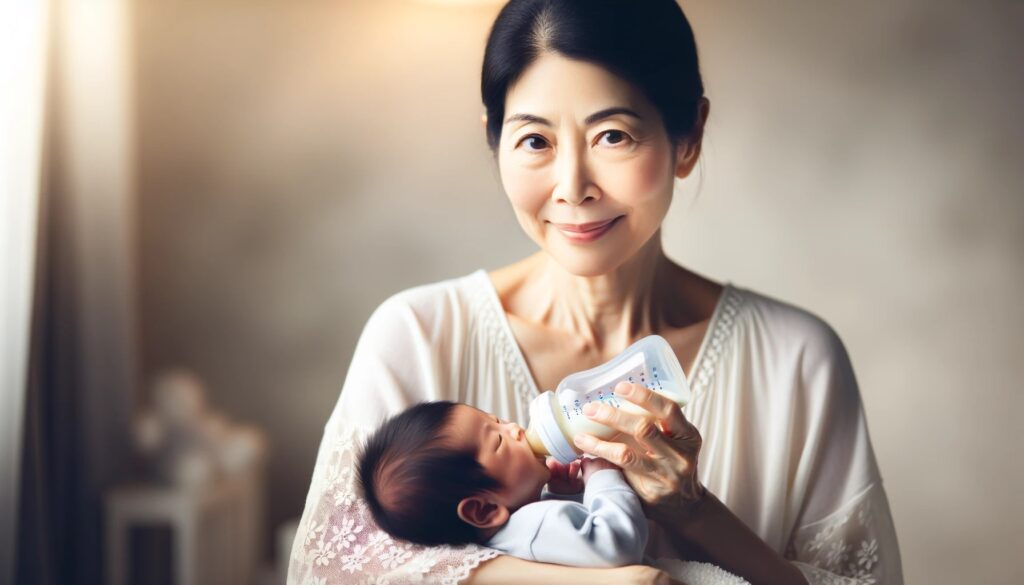
A key component of traditional confinement is the support of a specialized caregiver known as a yue sao (月嫂) or confinement nanny. These professionals combine practical skills in newborn care with deep knowledge of postpartum traditions, herbal cooking, and maternal support. For many families, hiring a confinement nanny represents a significant investment in the mother’s recovery and the baby’s early development.
月子保姆是做什麼的
越騷的綜合作用通常包括:
- 專業烹飪 – 根據中醫原則準備所有月子餐、滋補品和草藥湯
- 新生兒護理 – 處理餵養支援、洗澡、換尿布和監測嬰兒的健康情況
- 孕產婦護理 – 協助採取舒適措施、乳房護理和產後恢復
- 洗衣管理 – 清洗和消毒嬰兒用品和媽媽的衣服
- 傳統療法 – 進行草藥浴、腹部包裹和其他文化習俗
- 知識傳授 – 教父母基本的嬰兒護理技巧和產後恢復技巧
- 情感支援 – 在早期育兒挑戰中提供經驗豐富的指導
尋找合格的月子保姆
找到合適的 月騷 需要提前計劃和仔細考慮:
- 儘早開始 – 在孕中期開始搜索,因為最好的保姆通常會提前幾個月預訂
- Use reliable sources – Seek recommendations from friends, family, or reputable postpartum agencies such as My Asian Nanny
- 驗證證書 – 檢查認證、培訓和健康檢查
- 進行訪談 – 討論經驗、新生兒護理方法和烹飪能力
- 明確期望 – 明確飲食偏好、育兒理念和家規
- 檢查參考資料 – 與以前的客戶討論他們的經驗
典型安排和費用
月子保姆服務的結構和價格各不相同:
- 住家服務 – 最傳統的安排,保姆住在家裡提供 24/7 全天候支援
- 全面覆蓋 – 24/7 全天候照顧嬰兒和母親
- 可選膳食服務 – 獲得 yue sao 和為媽媽製作的傳統產後餐的額外好處
- Duration options – The standard length is 30 days, but many families choose 40 or even 100 days depending on recovery needs and cultural preferences. Medical complications, C-section births, or nursing challenges may require a longer period of support.
中國禁閉的現代改編
Zuo yuezi, or “sitting the month,” is a traditional Chinese postpartum recovery practice spanning approximately 30-40 days after childbirth. This ancient tradition, dating back thousands of years, has evolved to meet contemporary needs while preserving its core principles of rest, restoration, and maternal care.
In today’s fast-paced world, modern Chinese women both at home and abroad are finding innovative ways to honor this cultural tradition while adapting it to fit their lifestyles and beliefs. Many now incorporate evidence-based medical practices alongside traditional wisdom, creating a hybrid approach that honors heritage while embracing contemporary healthcare advances. Unlike in high income countries, where postpartum care guidelines often emphasize early mobilization, patient-centered care, and discourage strict confinement, Chinese practices maintain a focus on rest and specific dietary regimens. These differences highlight how postpartum care varies not only between China and high income countries, but also among other cultures with their own unique traditions.
Professional confinement services have emerged as a booming industry, offering everything from in-home confinement nannies (yue sao) to luxurious confinement centers providing hotel-like accommodations with specialized care. Apps and online platforms connect new mothers with certified confinement specialists, meal delivery services, and virtual support communities. Postpartum practices can differ significantly in different countries, with regions such as Latin America, East Asia, and Africa each having their own customs and guidelines for maternal care.
地區差異和文化差異
雖然共用核心原則,但東亞和東南亞的坐月子做法差異很大:
中國大陸:通常遵循更嚴格的傳統規則,強調避免寒冷元素並食用生薑、米酒和骨湯等溫熱食物。與南部地區相比,北部地區通常保持更長的禁閉期。
中國臺灣:非常重視專業的產後膳食計劃,在傳統食材的基礎上提供科學均衡的營養。現代化的月子中心在這裡特別受歡迎。
Hong Kong and Singapore: Often feature a blend of Chinese and Western practices. Professional confinement nannies are common, and practices tend to be more flexible regarding restrictions.
馬來西亞華人社區:將當地草藥和薑黃、檸檬草等食材融入傳統的中式月子食譜中,創造獨特的融合方法。
西方僑民:生活在西方國家的中國家庭通常會顯著適應做法,專注於特殊營養和避免寒冷等關鍵要素,同時放棄一些更嚴格的身體限制。
準備坐月子:檢查清單
分娩前 6 個月:
- 如果需要,研究和採訪月子保姆或中心
- 儲備月子草藥、紅棗和特殊成分
- 根據坐月子原則準備冷凍餐
一個月前:
- 安排家庭支援(家庭成員或聘請的幫手)
- 購買合適、寬鬆、舒適的衣服
- 在家中設置舒適的恢復空間
交貨周:
- 與家人敲定膳食計劃或送餐服務
- 在保溫瓶中準備熱飲(紅棗茶、薑汁水)
- 建立通信系統,以便在恢復期間提供支援
在現代擁抱傳統
中式月子是世界上歷史最悠久的產後傳統之一。無論是由祖母傳承的還是通過現代護理服務提供的,它都反映了對新媽媽需要什麼的深刻理解:營養、休息、溫暖和關懷。
通過完全或部分地接受這一傳統,您正在邁向全面和尊重的康復。身體發生了奇跡般的變化。它值得善意。心靈也需要空間來調整、反思和加強。Confinement 提供了一個容器,其中所有這一切都成為可能。
如果您計劃坐月子,請考慮在產後護理計劃中概述您的偏好。與您的伴侶或照料者進行清晰的溝通。選擇瞭解您目標的 Yue Sao、導樂或支持團隊。最重要的是,傾聽您的身體——讓傳統為您服務,而不是阻礙它。
Emotional Support During Confinement
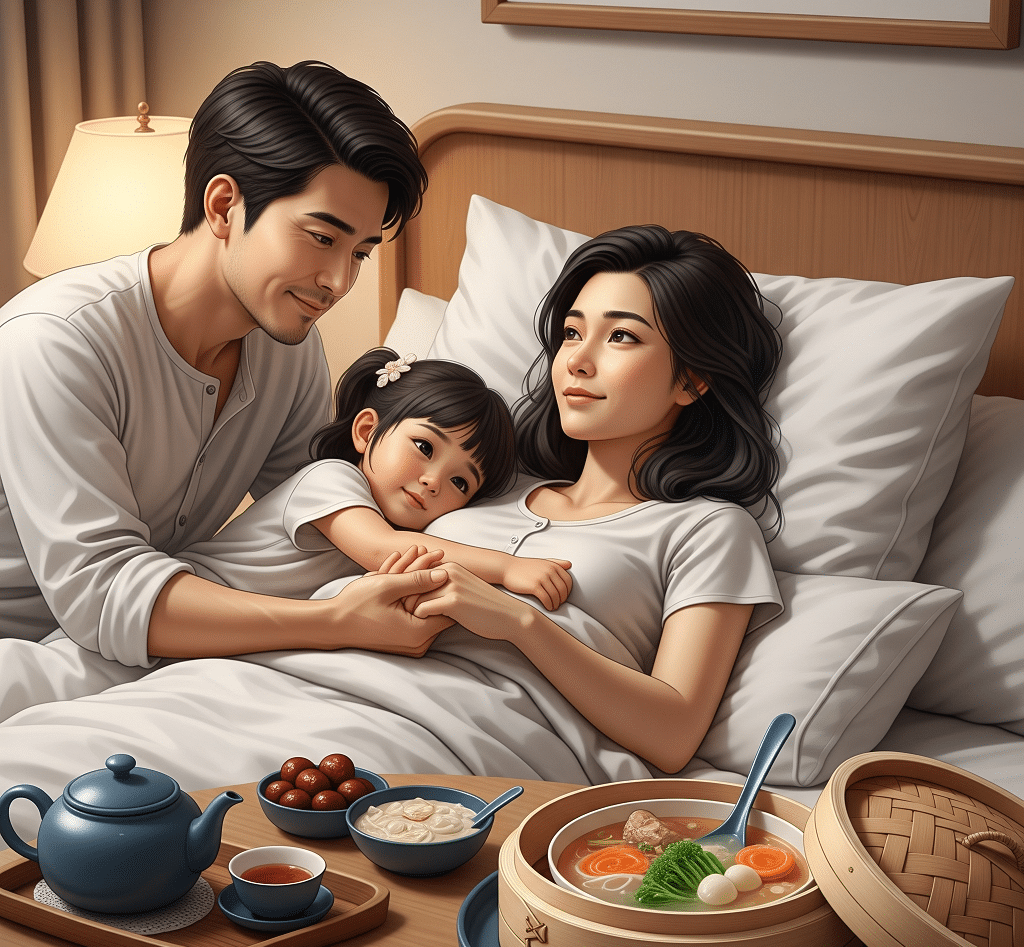
Emotional support is a cornerstone of traditional Chinese confinement practices, playing a vital role in the well-being of new mothers during the postpartum period. In addition to physical recovery, the confinement period is a time when new mothers are especially vulnerable to emotional ups and downs, including postpartum depression and anxiety. Chinese confinement practices recognize this need by fostering a nurturing environment where family members, a confinement nanny, or a postpartum doula provide not only practical help but also emotional care.
A confinement nanny or postpartum doula is often trained to offer reassurance, listen to concerns, and help new mothers adjust to the demands of caring for a newborn baby. In many families, the mother-in-law or other close relatives take on the responsibility of supporting the new mother, ensuring she feels valued and cared for. This emotional support can make a significant difference, helping new mothers feel less isolated and more confident as they navigate the challenges of early motherhood.
Every new mother’s needs are unique, and some may require more emotional support than others. Open communication with family members and caregivers is essential to ensure that the new mother’s emotional needs are met. By prioritizing emotional well-being alongside physical recovery, traditional Chinese confinement helps new mothers build a strong foundation for both themselves and their babies during this transformative time.
Common Challenges and How to Overcome Them
While traditional Chinese confinement practices offer many benefits, new mothers may encounter several challenges during the confinement period. One of the most common difficulties is adhering to strict dietary guidelines, which can sometimes feel overwhelming or restrictive. To make this aspect of postpartum confinement more manageable, new mothers can consult with lactation consultants or healthcare providers who understand Chinese postpartum confinement, ensuring that nutritional needs are met without unnecessary stress.
Another challenge is the limited physical activity often prescribed during the confinement period. While rest is important, a complete lack of movement can lead to muscle weakness and reduced blood circulation. Incorporating gentle physical activity, such as light stretching, yoga, or tai chi, can help maintain health and support recovery, as long as these exercises are tailored to the mother’s condition and approved by a healthcare professional.
Feelings of isolation and loneliness are also common, especially when new mothers spend extended periods indoors. Staying connected with family members, friends, or other new mothers through phone calls, video chats, or online support groups can help combat these feelings and provide much-needed encouragement. By acknowledging these challenges and seeking support, new mothers can make the most of their confinement period, focusing on both their physical and emotional well-being.
Support for New Moms
Support is essential for new mothers during the confinement period, and traditional practices in Chinese and other Asian cultures place a strong emphasis on community and family involvement. In addition to emotional care, practical assistance with household chores, childcare, and meal preparation allows new mothers to rest and recover fully. A confinement nanny or postpartum doula can be invaluable, taking on daily responsibilities so the new mother can focus on her own health and her newborn baby.
Family members, especially the mother-in-law, often play a central role in providing guidance and support, drawing on traditional practices to ensure the well-being of both mother and baby. In modern times, online resources such as blogs, forums, and social media groups offer new mothers opportunities to connect with others who are experiencing similar challenges, creating a sense of community even when physical support may be limited.
By recognizing the importance of both practical and emotional support, families can help new mothers navigate the postpartum period with greater confidence and resilience. Whether through traditional practices or modern resources, ensuring that new mothers feel supported is key to their health, well-being, and successful transition into motherhood.
